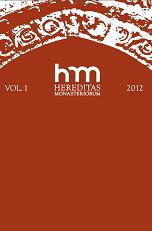Opinia Sekcji Duchownej Rzymskokatolickiej z 7 X 1829 r. w sprawie przeprowadzenia reformy Kościoła w Królestwie Polskim. Mało znane źródło do dziejów
The opinion of the Roman Catholic Clerical Section of 7th October 1829 on performing the reform of the Church in the Kingdom of Poland. Not well known
Author(s): Małgorzata KośkaSubject(s): History
Published by: Laboratoire de Recherches sur l'Histoire des Congregations et Ordres Religieux (LARHCOR)
Keywords: Roman Catholic Clerical Section; secularization; monastery; reform; Church; Kingdom of Poland; Central Archives of Historical Records; source; edition
Summary/Abstract: To emphasize the importance of Roman Catholic religion in the Kingdom of Poland, a separate Roman Catholic Clerical Section was established by the Government Commission on Religious Affairs and Public Enlightment. The Section under the leadership of the Primate of the Polish Kingdom has intermediated in relations between the Church and government authorities. It has informed the secular jurisdiction about the situation of the clergy, indicated candidates for ecclesiastical offices, preparing draft legislation concerning the priesthood. Its competence included also the collection of statistical data about the priests, monks, and seminar students. In January 1829 the minister of religious affairs asked the Section to prepare the opinion on the implementation of the decree of 17th April 1819, under the power of which part of the Roman Catholic monasteries were dissolved. The opinion prepared by the Section was reporting the progress of the Church reformation in Polish Kingdom since 1817, of which one of the stages was already mentioned dissolution of the monasteries. Draft amendments on the number of clerical positions and their staffing, “reformations” of the monasteries, and setting new borders were prepared by Government Commission on Religious Affairs in 1817. They were negotiated in Vatican on behalf of the Polish Kingdom by the Russia’s foreign minister Karl Nesselrode. The result was establishing archbishopric of Warsaw and bishopric of Podlachia, marking the new boundaries of the dioceses, and gaining the title of the Primate of the Polish Kingdom for the archbishop of Warsaw. In the papal bull Ex imposita Nobis of 30th June 1818 pope Pius VII also agreed to dissolve some of the abbeys and monasteries, and allocate the obtained funds to improve living conditions of the priests in parishes. As the papal delegate to perform the reformation of the Church was appointed the kujavian bishop Franciszek Malczewski, later also the archbishop of Warsaw, and since 1819 the Primate of the Kingdom. After assessing the value of ecclesiastical properties and financial needs it turned out that about seven hundred thousand polish zloty is missing (the annual incomes of the poor parishes did not exceed one thousand zloty). The archbishop Malczewski decided that the orders engaged in education of youth, living on alms, with low incomes, and those, which ensure many parish priests and vicars will not be dissolved. He indicated the monasteries of the former Austrian jurisdiction as the more affluent, and those convents from the former Prussian rule as the poorer ones. Franciszek Malczewski has developed only assumptions to the suppressive decree,his illness prevented him to continue the work. At the request of Government Commission the draft of the decree (despite the lack of formal authority) was prepared by bishop Szczepan Hołowczyc. Archbishop Malczewski,to the insistence of minister of religious affairs,signed it on 17th April 1819, the day before his deat
Journal: Hereditas Monasteriorum
- Issue Year: 2012
- Issue No: 1
- Page Range: 285-301
- Page Count: 17
- Language: Polish

